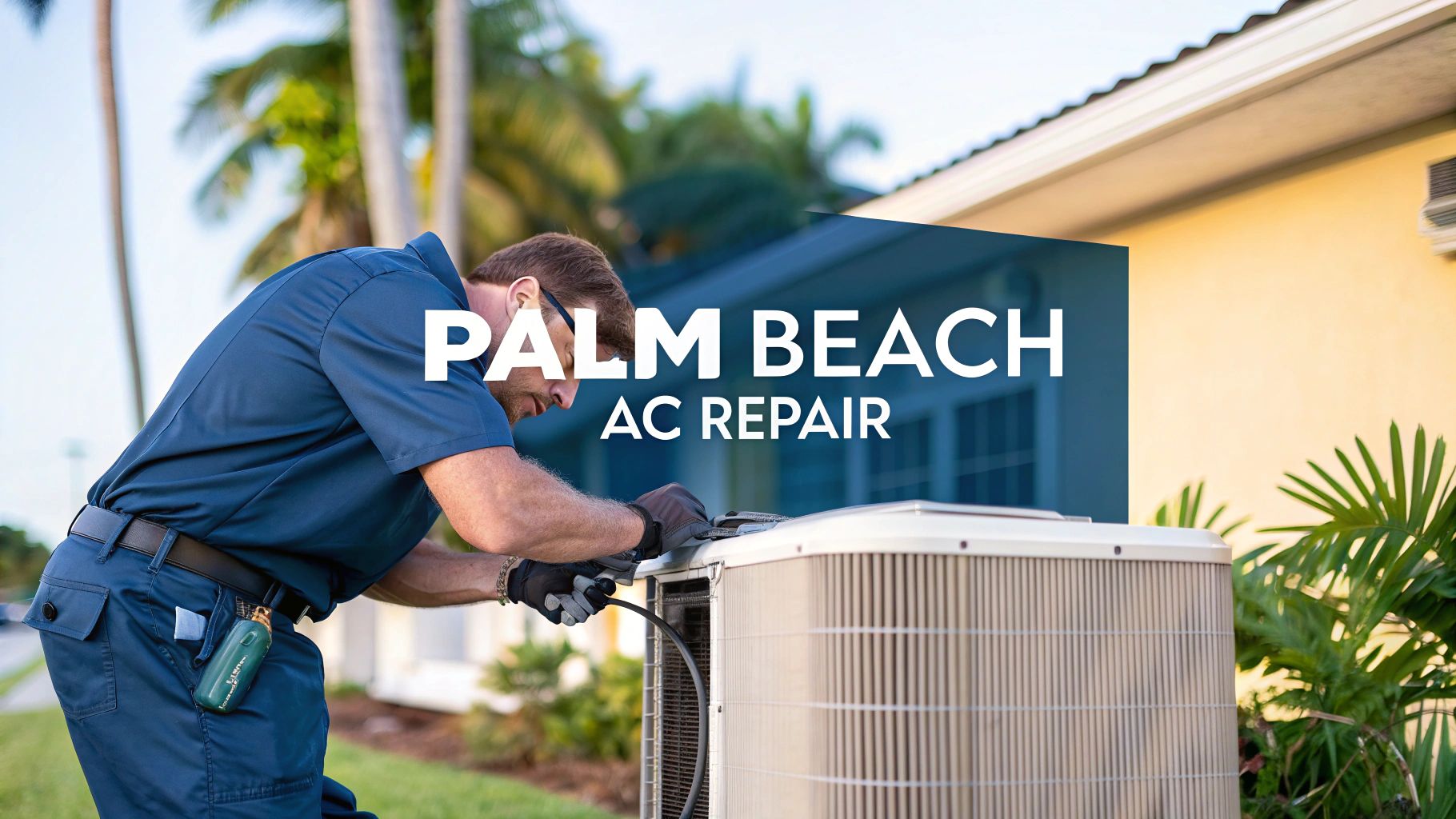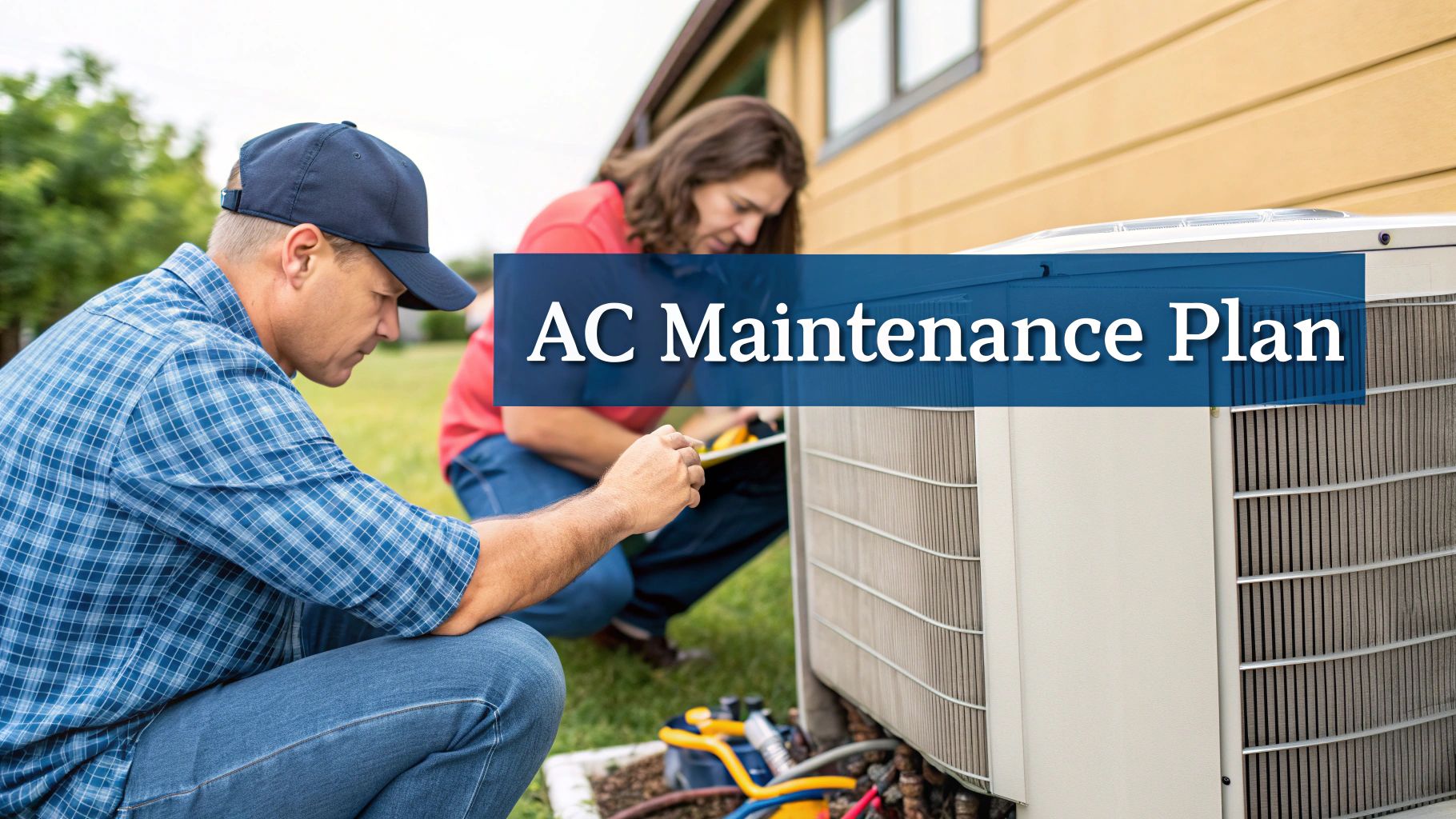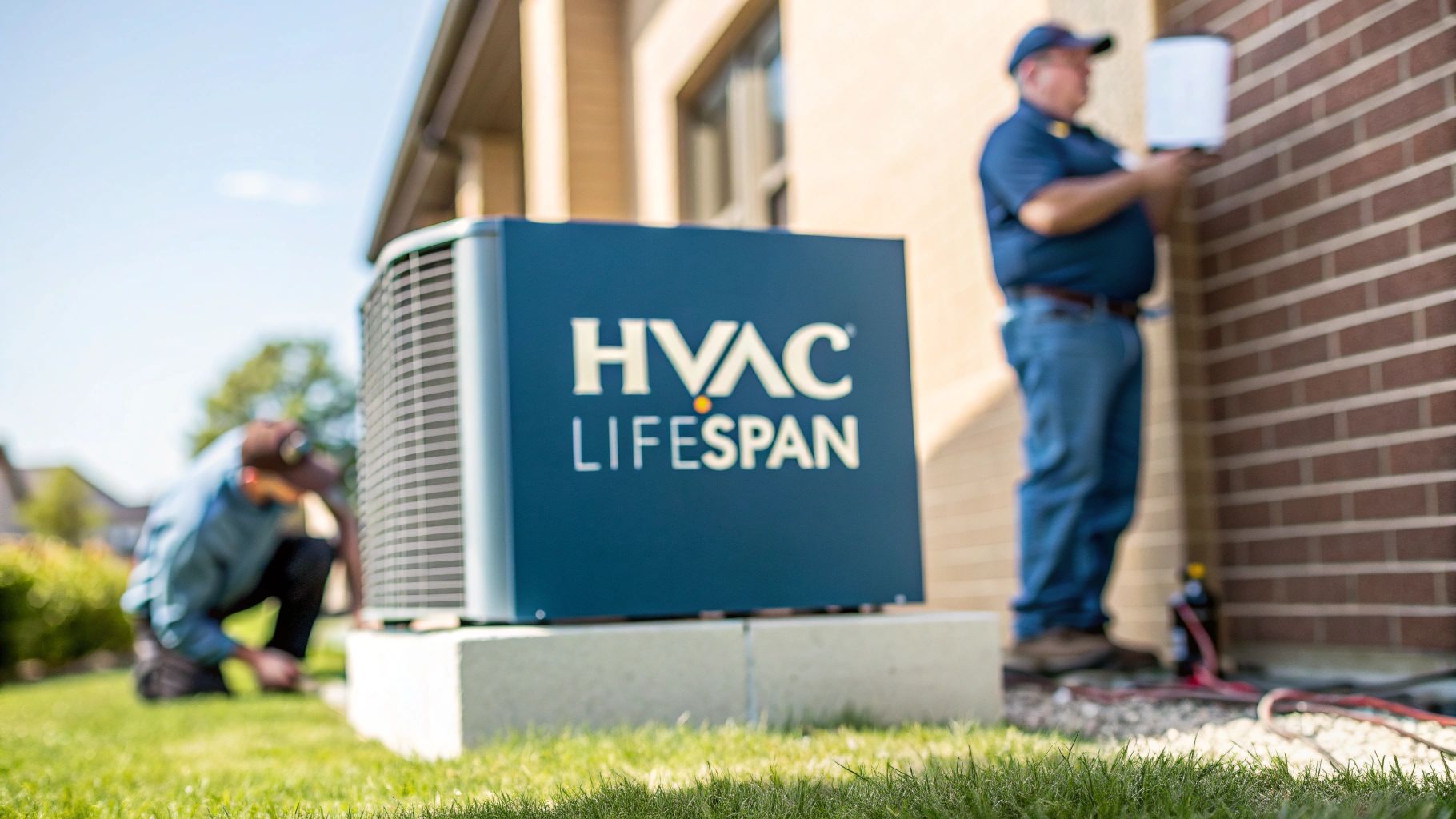When your AC gives out in the middle of a sweltering Florida summer, finding a trustworthy Palm Beach County AC repair service becomes an emergency. A broken air conditioner isn't just a minor hassle—it’s a major disruption to your comfort and peace of mind. This guide is here to walk you through everything you need to know.
Why Your AC Is Your Most Important Home Appliance
Here in Palm Beach County, an air conditioner isn't a luxury; it's the heart of your home. It's constantly battling the intense heat and humidity that we're all too familiar with. When it’s running smoothly, you probably don't even think about it. The second it stops, however, you realize just how essential it is.
Recognizing the crucial role your AC plays helps you understand why getting it fixed quickly and correctly is so important. A system that's on the fritz can cause a whole host of problems beyond just feeling hot.
- Health and Safety: Extreme indoor heat can be dangerous, especially for young children, the elderly, and even your pets.
- Property Damage: A leaky AC is a recipe for disaster, potentially causing serious water damage to your ceilings, walls, and floors if you don't catch it early.
- Skyrocketing Energy Bills: An AC that's struggling has to work much harder, which means it's guzzling electricity and driving up your utility costs.
Taking a Proactive Approach
This guide is about more than just what to do when your AC is already broken. It’s about giving you the knowledge to spot trouble early, know what a fair repair price looks like, and choose a local technician you can count on. Think of it like maintaining your car—a little routine care can prevent a major breakdown on the highway during a Florida heatwave.
A sudden spike in your energy bill is often the first and most subtle sign that your AC system is working overtime to compensate for an underlying issue. Ignoring it can turn a minor fix into a major expense.
Our goal is to help you make smart decisions that save you money and keep your home comfortable. For a wider look at cooling systems, you might find this general air conditioning information helpful. By getting a handle on the basics of Palm Beach County AC repair, you can avoid the stress of an unexpected breakdown and keep your cool all year long.
Decoding Common AC Problems in Florida Homes
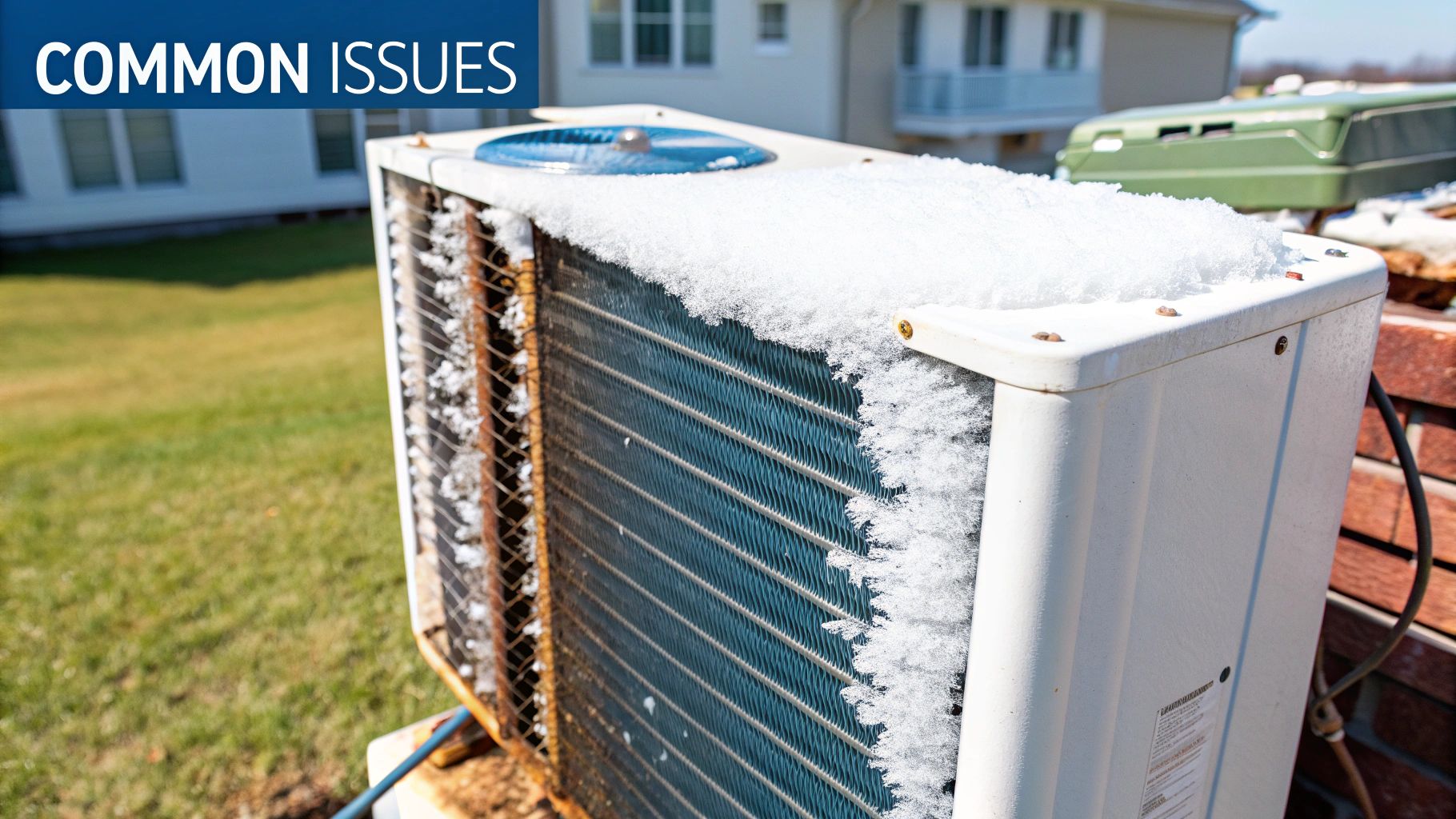
Your air conditioner is a complex piece of machinery, and here in the relentless Florida humidity, it works harder than almost anywhere else. When something goes wrong, it usually sends out warning signs—maybe it's strange noises, weak airflow, or a sudden spike in your FPL bill. Learning to spot these signals is the first step toward a quick and effective Palm beach county ac repair.
These issues rarely pop up out of the blue. More often than not, they’re a direct result of the unique environmental challenges our systems face every single day. Let's dig into some of the most common culprits you're likely to run into.
Common AC Symptoms and Potential Causes
Sometimes, figuring out what your AC is trying to tell you can be tricky. This quick reference table can help you connect the dots between what you're noticing and what might be going on behind the scenes.
| Symptom You Notice | What It Could Mean | Next Steps |
|---|---|---|
| AC won't turn on at all | Tripped circuit breaker, thermostat issue, or a failed electrical part | Check your breaker box and thermostat settings first. If that doesn't work, it's time to call a pro. |
| Weak or no airflow | A severely clogged air filter, blocked vents, or a failing blower motor | Change your air filter. If airflow is still weak, you'll likely need a technician. |
| AC blows warm air | Low refrigerant from a leak, a dirty outdoor coil, or a faulty compressor | This almost always requires professional diagnosis to pinpoint the exact cause. |
| Unit makes strange noises | A loose part, failing motor bearings, or debris in the fan | Turn the system off and schedule a service call to prevent further damage. |
| Water leaking indoors | A clogged condensate drain line or a cracked drain pan | Shut off the AC to prevent water damage and call for service immediately. |
| Unit constantly cycles on/off | An oversized unit, low refrigerant levels, or a thermostat issue | This "short cycling" is inefficient and damaging. A pro can diagnose the root cause. |
Remember, this table is just a starting point. A professional technician can provide a definitive diagnosis and a safe, effective solution.
The Mystery of Refrigerant Leaks
One of the most misunderstood AC problems is a refrigerant leak. A lot of people think their AC "uses up" refrigerant, like a car burns through gas. That's not how it works. Your AC is a closed-loop system, which means the refrigerant level should stay the same for its entire life.
If a tech tells you you're low on refrigerant, it's a sure sign of a leak. Just "topping it off" is like putting more air in a tire with a nail in it—it's a temporary fix, not a real solution. A good technician will find and seal the leak before recharging the system to make sure the problem is solved for good.
Clogged Drains and Surprise Water Damage
Think of your AC’s condensate drain line as its plumbing. As the unit pulls all that sticky moisture out of the air, it collects water that needs a way to get out. Here in Palm Beach County, the combination of constant moisture and warmth is the perfect recipe for algae and mold to grow inside that drain line.
Once it’s clogged, the water has nowhere to go but back into your house. That's when you see those dreaded water stains on the ceiling or find the emergency drain pan overflowing. Keeping this line clear is a simple but absolutely crucial part of regular AC maintenance.
A frozen evaporator coil is a classic sign of trouble, but it's rarely about the unit being "too cold." More often than not, it’s a symptom of restricted airflow caused by a dirty filter or a malfunctioning blower fan.
Electrical Hiccups and Component Failure
The constant on-and-off cycling during our long, brutal summers puts a ton of stress on your AC's electrical parts.
- Capacitors: These small, cylinder-shaped parts give the compressor and fans the jolt of electricity they need to start up. They are one of the most common components to fail from heat and wear.
- Contactors: This is basically a switch that controls the power going to your outdoor unit. Over time, it can simply wear out, leaving your system unable to start.
- Blower Motors: The fan motor inside your air handler is what pushes the cool air through your vents. If it gives out, you won't feel much of anything coming out.
As homeowners expect more from their cooling systems, the entire HVAC market is growing. The U.S. market hit $30.41 billion in 2023 and is expected to grow by 7.4% each year through 2030, largely because people want more efficient units. This trend is great for consumers, as it pushes repair services to keep up with the latest technology.
Knowing what might be wrong helps you explain the situation clearly when you call a professional. For a deeper look at what you can check yourself, take a look at our comprehensive air conditioning troubleshooting guide.
What to Expect During an AC Repair Service Call
There’s nothing worse than a dead AC unit, but knowing what to expect when the technician arrives can make the whole situation a lot less stressful. A good Palm Beach County AC repair call isn’t some mysterious process; it’s a straightforward, step-by-step investigation to get your cool air back on.
It all starts with your phone call. The more information you can give the dispatcher, the better prepared the technician will be when they get to your door.
- Tell them the brand and rough age of your unit. Is it a 15-year-old Trane or a 5-year-old Carrier? This little detail helps them anticipate what parts they might need.
- Describe the symptoms. "It's not working" is a start, but specifics are much better. Try something like, "The fan is running, but the air is warm," or "There's a loud clanking noise coming from the unit outside."
- Mention what you've already done. Did you already reset the breaker or change the filter? Letting them know saves time and helps them jump right into the real problem.
Once the technician is at your home, they switch into detective mode.
The Diagnostic and Quoting Process
Think of the technician's first job as figuring out why your AC failed, not just what part broke. They're looking for the root cause. This means they won't just rush in and start swapping components.
Instead, they'll perform a thorough inspection. This usually involves checking thermostat settings, looking over all the electrical connections, measuring refrigerant pressure, and examining key parts like the compressor, capacitors, and fan motors. This methodical check ensures they fix the actual problem, so you don't have to call them back a week later for the same issue.
Any trustworthy technician will give you a clear, detailed quote before they pick up a single tool. This quote should break down the cost of parts and labor, so you know exactly what you're paying for. No surprises.
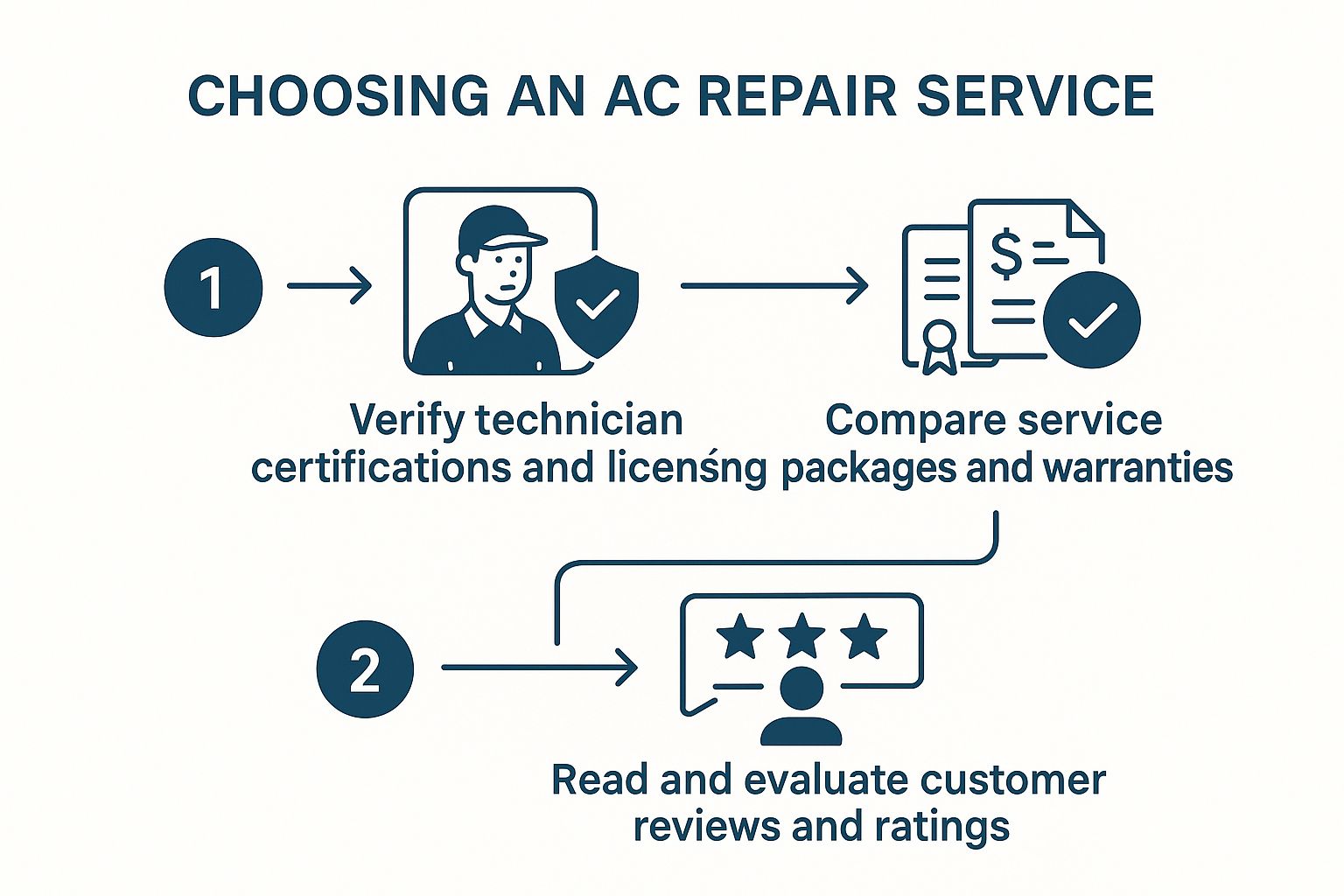
Following a few simple steps—like checking for licenses, comparing what different companies offer, and reading recent reviews—is the best way to feel confident you’re hiring a real pro.
Completing the Repair and Final Checks
Once you give them the green light on the quote, the technician gets to work. Most experienced techs carry a truck full of common parts—like capacitors, fuses, and contactors—so they can often complete the repair in one visit. If it's a more serious problem, like a failed compressor, they may need to order the specific part.
But the job isn't done just because the new part is in. Before they leave, the technician will run your system through a full cycle. They'll check the air temperature coming out of the vents and make sure everything is running smoothly and safely. This final check is their promise to you that the problem is truly fixed.
What Will My AC Repair Cost in Palm Beach County?
Let’s be honest, when your AC dies, one of the first things you worry about is the bill. No one likes surprise expenses, so getting a handle on what goes into an AC repair quote can take a lot of the stress out of the situation. There's no single price tag for a Palm Beach County AC repair—it’s always a mix of a few different things.
It all starts with the service call fee. This is the initial charge, usually somewhere between $75 and $150, that covers the technician's time and fuel to get to your home and diagnose the problem. Think of it as the price for getting an expert's eyes on your system to figure out exactly what’s gone wrong.
Breaking Down the Final Bill
After the technician finds the culprit, the final cost really boils down to two things: parts and labor. Here in Palm Beach County, you can expect labor rates to run between $100 and $200 per hour. Naturally, the more complicated the job, the longer it will take.
Here's a rough idea of how that plays out:
- Minor Repairs: If it's a simple fix, like swapping out a bad capacitor or a contactor, it’s a pretty quick job. A technician can often get it done in an hour or less, and the parts are usually under $100.
- Moderate Repairs: Things like replacing a fan motor or tracking down and sealing a refrigerant leak take a bit more time and skill. These jobs can take a few hours, and the parts are more expensive.
- Major Repairs: The biggest repair bills are for the big-ticket items. If your compressor or evaporator coil fails, you're looking at a serious repair. These are time-consuming, and the parts alone can easily top $1,000.
If you want to see more detailed price ranges for common problems, our guide on air conditioning repair costs breaks it down even further.
Here's a solid piece of advice we always give homeowners: If a repair quote is more than 50% of what it would cost to install a brand-new system, it’s almost always smarter to replace it.
The Big Question: Repair or Replace?
This is a tough spot for any homeowner. Do you sink more money into an old unit or bite the bullet and invest in a new one? If your system is over 10-12 years old and needs a major, costly repair, it's probably time to start thinking about a replacement.
Yes, a new system is a bigger upfront investment. But a modern, high-efficiency unit will immediately start saving you money on your monthly power bills. Over a few years, those savings can really add up and help offset the initial cost.
The bigger picture matters, too. Florida's HVAC market is a massive $9.6 billion industry for a reason—air conditioning is a necessity here, not a luxury. With the local real estate market constantly shifting, homeowners are more focused than ever on home value and efficiency. A reliable, new AC system isn't just a comfort item; it's a major asset. You can discover more insights about the Palm Beach County market to see how these trends affect home maintenance priorities.
A good technician won't just push you one way or the other. They should give you clear, honest quotes for both the repair and a potential replacement, so you can make the right call for your home and your wallet.
How to Choose the Right AC Repair Company
Let’s be honest, choosing a company for your Palm Beach County AC repair can feel as stressful as the breakdown itself. The technician walking through your door holds the quality of the repair, the fairness of the price, and your overall peace of mind in their hands. A great pro can turn a crisis into a simple fix, but the wrong one? They can make a bad situation a whole lot worse.
Thankfully, you don't have to just close your eyes and point at a name in a search result. With a little know-how, you can confidently sort through your options and find someone you can trust to get your air conditioning running again.
Start with the Essentials
Before you even think about reviews or quotes, there are a couple of absolute must-haves. Think of these as the basic entry requirements for any legitimate AC company.
- Licensing and Insurance: First things first, verify that the company is licensed to work in Florida and carries both liability insurance and workers' compensation. This is your safety net, protecting you from any responsibility if an accident happens on your property.
- Certifications: Keep an eye out for technicians who are certified by reputable organizations like NATE (North American Technician Excellence). This isn't just a fancy badge; it proves they're serious about their craft and stay up-to-date on their training.
These aren't just bureaucratic boxes to check. They're your first line of defense against sloppy work and potential legal headaches.
Digging Deeper Than Star Ratings
Online reviews are a fantastic starting point, but the real story is often found between the lines. Don't let a simple star rating be your only guide.
Look for patterns. Are customers consistently mentioning the technician's professionalism, clear communication, or how they showed up on time? On the flip side, are you seeing repeated complaints about surprise charges, no-shows, or fixes that just didn't hold up? A couple of unhappy customers happen to every business, but a consistent theme of problems is a major red flag.
A crucial piece of advice: Always get at least three written estimates before you commit. It’s not just about shopping for the best price—it’s a great way to gauge each company’s diagnostic process and professionalism.
A good estimate is detailed, breaking down the costs for both parts and labor. If a company gives you a vague quote over the phone without even looking at your unit, be cautious. The best Palm Beach County AC repair experts will always insist on a thorough diagnosis first.
It's also worth noting that the HVAC industry is dealing with a shortage of skilled technicians nationwide. Here in Florida, there's a big push for energy efficiency, so it's vital to find a pro who understands modern, high-SEER systems. You can learn more about top HVAC trends in Florida to see why this matters. Finding a well-staffed company with up-to-date knowledge has never been more important.
Simple Maintenance to Prevent Future AC Repairs
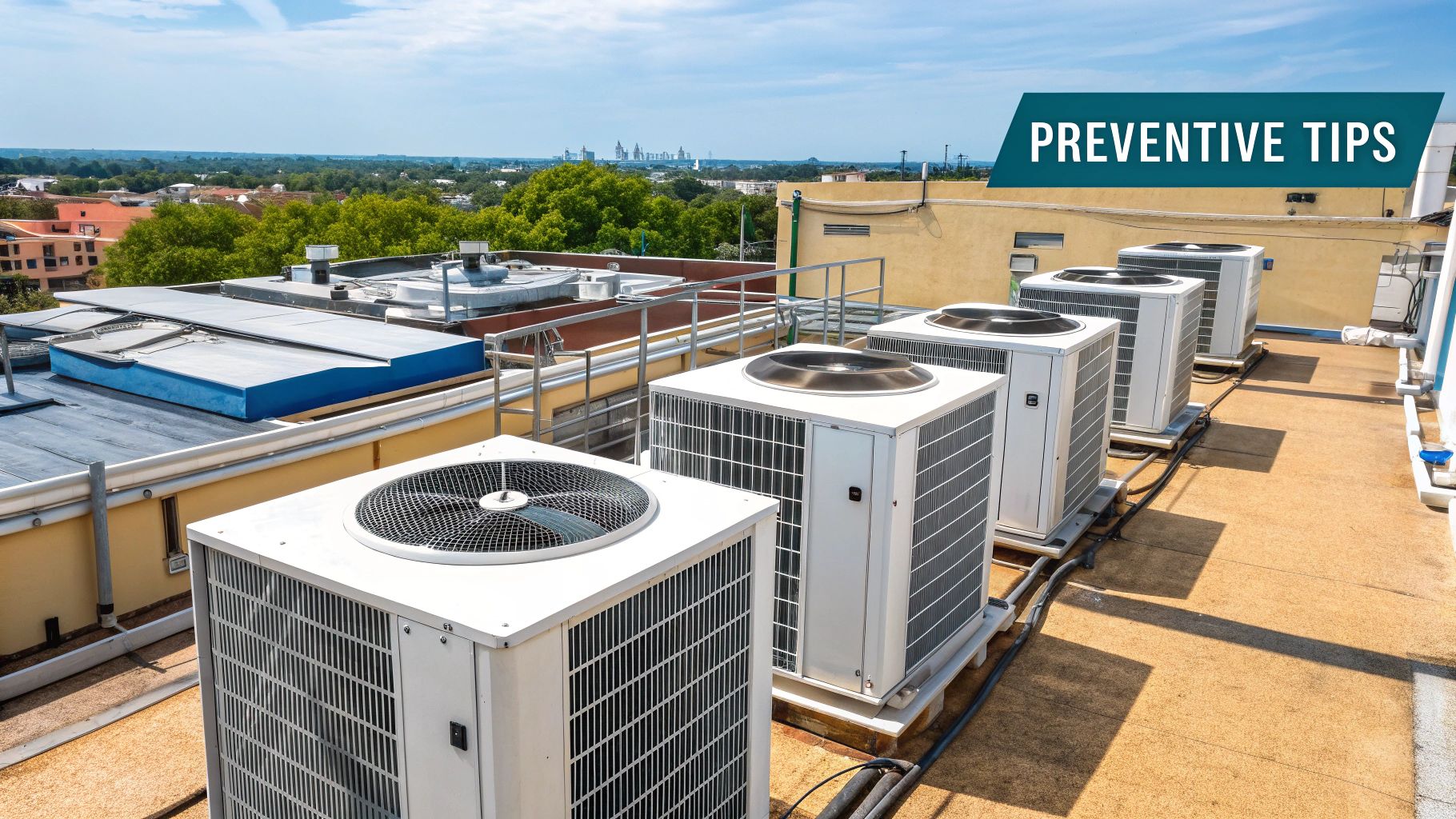
The best way to deal with a pricey emergency AC repair is to stop it from ever happening. Think of proactive maintenance as a shield for your air conditioner—it protects the system from the relentless strain of our Palm Beach County climate and saves you a ton of money in the long run.
The good news? Many of the most effective tasks are surprisingly simple. You don’t have to be an HVAC expert to keep your system running healthier and more efficiently.
Your DIY Maintenance Checklist
If you do only one thing, make it this: change your air filter regularly. A clogged filter forces your AC to breathe through a straw. It chokes off airflow, making the whole system work overtime, which spikes your energy bills and can even cause the coils to freeze over.
Beyond the filter, it’s a good idea to take a quick walk outside and check on your condenser unit now and then.
- Clear Debris: Make sure there’s at least a two-foot bubble of clear space around the unit. Trim back bushes, pull weeds, and cut any branches that are getting too close.
- Remove Obstructions: Gently clear away any leaves, grass clippings, or dirt that’s built up on the fins. Your unit needs to breathe to release heat, and good airflow is non-negotiable.
Making these simple checks part of your regular monthly home maintenance practices can go a long way in preventing breakdowns and getting more years out of your AC.
The Value of a Professional Tune-Up
While these DIY steps are a great start, they can’t take the place of an annual professional tune-up. This is like a complete physical for your air conditioner, where a trained technician can spot things you can't.
A well-maintained HVAC system can last 15-20 years or more, while a neglected one might give out in under a decade. Annual service is a small investment to protect a major home appliance.
During a tune-up, a pro will get into the nitty-gritty. They'll clean internal components like the evaporator and condenser coils, lubricate moving parts to reduce friction, check refrigerant levels, and tighten electrical connections.
This kind of deep cleaning and inspection doesn't just boost efficiency; it catches tiny problems before they snowball into a full-blown Palm Beach County AC repair emergency. To see exactly what’s involved, our https://floridacoolinggroup.com/hvac-preventive-maintenance-checklist/ gives you a fantastic play-by-play of the process.
Your Top AC Repair Questions Answered
When your AC acts up, you've got questions. We get it. Here are some straightforward answers to the things homeowners in Palm Beach County ask us most often.
How Often Should My AC Be Serviced in Florida?
Down here in Palm Beach County, our air conditioners work overtime almost year-round. That’s why we strongly recommend getting a professional tune-up once a year.
The best time to do this is in the spring, right before summer's peak heat arrives. A spring check-up lets a technician catch and fix minor issues before they turn into major, expensive breakdowns in the middle of July. It also keeps your system running efficiently, which can make a real difference on your FPL bill.
Is It Better to Repair or Replace My Air Conditioner?
This is a big one, and it really comes down to age, the cost of the repair, and your unit's efficiency. A handy guideline we use in the industry is the "5,000 rule."
Here’s how it works: multiply your AC unit's age in years by the quoted repair cost. If that number is over $5,000, replacing the unit is probably the smarter financial move.
For example, if your 8-year-old unit needs a $700 repair, the total is $5,600. In that case, putting that money toward a new, more efficient system often makes more sense in the long run.
Think about it this way: if your system is already over 10-12 years old and needs a major part, a new model will be so much more energy-efficient that the savings on your monthly bills can help pay for the new unit over time.
What Is Included in a Standard AC Diagnostic Fee?
The diagnostic fee, sometimes called a service call fee, covers the technician's time and travel to get to your home and thoroughly inspect your system. It’s not just a quick look—it’s a deep dive to figure out exactly what’s gone wrong.
Once they've pinpointed the problem, the technician will walk you through what they found and give you an exact, upfront price for the repair. The good news is that with most reputable companies, if you decide to go ahead with the work, that initial diagnostic fee is rolled into the total repair cost. You're not paying it twice.
When you need answers and reliable AC service, you want experts who truly understand Florida's demanding climate. Contact Florida Cooling Group today for honest diagnostics and fast repairs. Schedule your service call now!
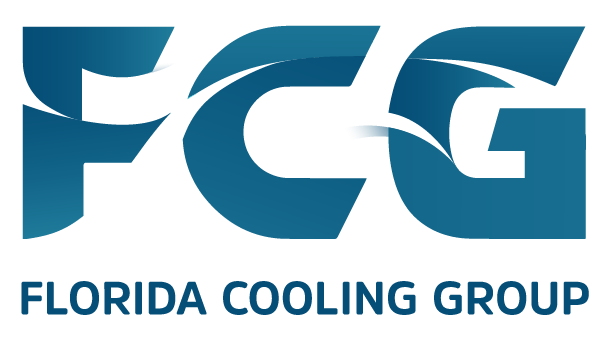
 (561) 400-2205
(561) 400-2205